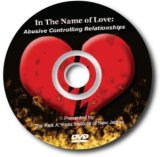BBC News/January 17, 2018
When two women wrote about how they had been “gaslighted” – made to question their sanity by an abusive partner – many readers, male and female, got in touch to share similar experiences. Here, three of them explain how they were left feeling utterly isolated.
I moved from southern England to a small Scottish village to be with the love of my life, a handsome and charming man who made me feel more alive and special than I ever thought possible.
Just before I moved, a friend said he thought my boyfriend wouldn’t be happy until he had me living in the middle of nowhere, far away from anyone and all to himself. At the time I laughed it off but it turned out it couldn’t have been more true.
At first he was completely attentive. He worked away as a lorry driver but he called every morning, throughout the day and last thing at night. I thought this was really nice of him but I started to notice he was really ratty if I missed a call because I was in the bathroom or in a shop. He became more and more short-tempered when I told him I had begun to make friends, causing us to have arguments on the phone.
One day, after he had left for work, a woman from the village asked if I would like to go round to her house for some wine. I had a really nice evening. When I got home, my mobile had several missed calls and many text messages. I had left it behind and not thought about it. The text messages started off asking why I wasn’t answering the phone, and descended into calling me all sorts of horrible names, accusing me of being out with other men and so on. I couldn’t believe what I was reading – this had come out of nowhere. I sent him a text explaining where I had been. He immediately called and shouted at me for 10 minutes, not letting me speak.
These arguments would make me feel terrible and he would blame me for not being able to concentrate or sleep because he was worrying about me, and therefore a danger on the road. But then he would send lavish flowers and I would feel grateful he wasn’t angry with me any longer. I lived in a constant state of confusion and worry, never knowing what I had done to make him angry, and worried in case he had an accident.
Another time, when he was home, I was walking up the lane to our house when the farmer who owned the land stopped by. We leaned over the farm gate and had a long chat, looking out at the beautiful view. When I went into the house my boyfriend was sitting in a chair, staring at me. He kept denying there was something wrong, but he wouldn’t speak to me and kept glaring. Eventually he said he knew what had been going on all this time – I was making a fool of him and having an affair with the farmer! I couldn’t believe my ears, but he wouldn’t listen to me.
I soon stopped visiting my friends in the village. I didn’t dare go out in the evenings because he would call the house phone to check where I was. He didn’t like me going out to work either, so I was pretty much stuck at home in the middle of nowhere. In some ways it was a relief because I didn’t have to pretend to people that all was well.
I spent the next nine years walking on eggshells, never knowing if I was doing the right thing or the wrong thing in his eyes. His ultimate punishment was to attempt suicide. He did this more than once after an argument, which completely destroyed my confidence in myself. I was a confident, independent person when we met, and by the time he eventually left me I was a shell.
He would also try to make me think I had gone mad by claiming I had said things that I knew I hadn’t.
Silly things, like I’d make spaghetti Bolognese and he’d accuse me of adding carrots just to upset him, even though I followed the same recipe every time. Or he would say I hadn’t cleaned a room when I had, and would clean it all over again.
Taken individually, those incidents seem stupid and trivial but he would be so convincing that I would start to question myself. I actually thought there was something wrong with my memory.
I couldn’t argue any more. I couldn’t get my brain to think of a good response because his arguments were completely irrational. It was easier to just agree. I became a quiet, dull person – a shadow of my former self.
What is gaslighting?
- The term comes from a 1938 stage play Gas Light in which a husband attempts to convince his wife and others that she is insane – when he dims the gas lights, he insists she’s imagining it
- It is one tactic of coercive and controlling behaviour that aims to make a victim doubt themselves, their perception of events and even their own sanity, with devastating consequences, says Katie Ghose, chief executive of Women’s Aid
- Techniques include calling into question the victim’s memory of an incident, trivialising a victim’s thoughts or feelings, accusing the victim of lying or making things up, denying things like promises that have been made, and mocking the victim for their “misconceptions”
- Some of the signs to watch out for include: feeling confused, continually apologising to your partner, having trouble making simple decisions, and withholding information from friends and family so you don’t have to make excuses for your partner
- Am I in an abusive relationship?
I didn’t really look like myself either – he didn’t like me going to get a haircut because I had a male hairdresser, so I started cutting my own hair. I stopped wearing make-up or high heels. If I wore nice clothes, I was “dressing up” for somebody. I had to think about everything I did.
Before, I was confident, I was always happy, always laughing. If I laughed at something on TV, he would get angry – he thought I was laughing at him.
I trained myself not to be happy. Friends of mine have said, “How on Earth do you do that?” But it’s the only way to cope. If you don’t let yourself be happy, you can’t get too hurt or upset by what’s happening to you. It doesn’t make a lot of sense, looking back.
I made two failed attempts to leave. But mostly I felt like I’d made my bed with this person, and I had given up too much to be with him. I hoped it would all turn around and it would be OK – but it never was. It’s a bit like a dog that isn’t treated well – it stays loyal to the person that feeds him.
The day he told me we were splitting up I thought I had won the lottery but a few months later, he decided he wanted to get back together. When I refused, he tried to lure me back to the house. That was really quite scary. He was on a mission – if he couldn’t have me, then nobody could. I was afraid he was going to kill us both.
I spent about three years hiding from him, constantly moving house. I completely disappeared.
What I didn’t realise was that it would take years for me to get back to being myself and repair the damage he did to me.
I will never forgive him and I’m telling my story so that hopefully it might help somebody else.
Caroline, UK






